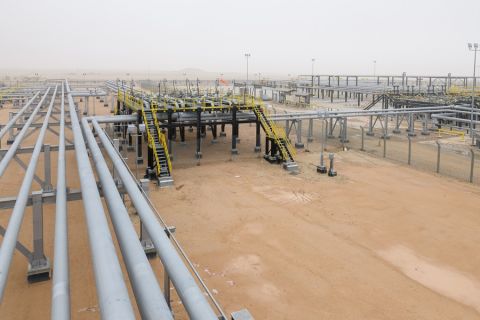Since emerging from Chapter 11 in 2001, KCS Energy has continued to improve its balance sheet and operations. It is finally back on track, with production and cash flow per share increasing again, according to president and chief executive James Christmas. The Houston-based company recently closed an offering of 6 million common shares at $8 each. The stock has been hovering at the top end of its 52-week trading range of $1.15 to $8.79 per share. Christmas spoke to New York Society of Security Analysts oil and gas conference attendees recently. In January 2003 and again this November, KCS amended and increased its bank borrowing facility with a group of lenders, with the most recent action giving it a $100-million revolver with an interest rate of Libor plus 2.25% to 3%. The firm has whittled down debt from a high of $425 million in early 1999 to under $200 million currently. For the nine months ended September 30, revenues were up 38% despite that production had declined 14% due to the sale of some noncore properties. Annual production had been falling every year since 1999 for two reasons: divestments of noncore assets, and a volumetric production payment (VPP) to which some production was dedicated. The VPP has since expired and thus, production from those properties is now 100% part of KCS' total results. Production is expected to increase for the first time in 2004 thanks to good results recently announced from infill drilling in northern Louisiana, onshore Texas and in Oklahoma, which are the company's three core areas. KCS drilled 75 gross wells in 2003 and expects to drill about the same number in 2004. Production in the third quarter was averaging 100 million cu. ft. a day. Frank Bracken, an E&P analyst for Jefferies & Co., recently had a Buy on KCS, saying he viewed it as an under-followed growth story. He projected 24% production growth in 2004 and increased his 2004 cash-flow-per-share estimate to $2.40 from $2.03.
Recommended Reading
Shipping Industry Urges UN to Protect Vessels After Iran Seizure
2024-04-19 - Merchant ships and seafarers are increasingly in peril at sea as attacks escalate in the Middle East.
Paisie: Crude Prices Rising Faster Than Expected
2024-04-19 - Supply cuts by OPEC+, tensions in Ukraine and Gaza drive the increases.
Report: Freeport LNG Hits Sixth Day of Dwindling Gas Consumption
2024-04-17 - With Freeport LNG operating at a fraction of its full capacity, natural gas futures have fallen following a short rally the week before.
Permian NatGas Hits 15-month Low as Negative Prices Linger
2024-04-16 - Prices at the Waha Hub in West Texas closed at negative $2.99/MMBtu on April 15, its lowest since December 2022.
BP Starts Oil Production at New Offshore Platform in Azerbaijan
2024-04-16 - Azeri Central East offshore platform is the seventh oil platform installed in the Azeri-Chirag-Gunashli field in the Caspian Sea.


